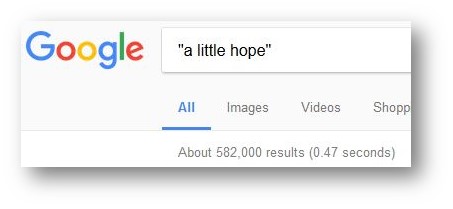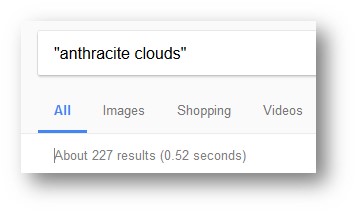A simple classroom technique, when drafting and editing.
Recently, I have been doing quite a bit of drafting and editing of creative writing with Year 5 and 6 pupils, and I have been finding this little game useful. I’m sure it’s not original, and I have used it with older students since search engines became a thing, but it is still new to many teachers – so here it is. (It’s very, very simple.)
When a pupil has used a phrase which seems rather obvious, tired or clichéd, Google it on the board (with speech marks around it) to demonstrate just how common it is across the internet. The game then is to look for alternatives, which have fewer results. (The Holy Grail is for there to be none.)
For example, a pupil has written about how sailors adrift in a lifeboat hold on to “a little hope.” We decide that we’ve heard this phrase a lot before, so we Google it on the board. There are 582,000 results.

There is some excitement when, comparing the sailors’ hope with their damaged sails, we come up with “torn hopes.” There are 1,680 results.

Not satisfied, we decide to sneak in a (‘working at expected’) hyphen, in “wave-torn hopes”. Gloriously, this is completely new to Google.

This is more likely when results are ‘verbatim’, which is an option in the search ‘Tools’.


Along the way, there are opportunities to explore snippets of writing in which the phrase has been used. For example, a pupil has referred to ‘grey clouds’. We decide this is a bit obvious, and Google it. There are 462,000 results.

Someone suggests ‘stony clouds’, which gives 1,510 results, which the class decide is still too many.

A geologically-minded pupil suggests the more specific ‘anthracite clouds’. Since we’re on Google, we look at some images.

The phrase turns up 227 results.

Intrigued, we look at one of the snippets on the search page.
So how has this writer used the phrase? What is the effect? Is it to convey the shininess of clouds in a rain storm? Is it because the word sounds strong and powerful, like thunder?
Next, we try personification. The mood in the story is uneasy, so perhaps the clouds could be too? Now, there are 485 results.

Again, of course, we have to look at a snippet.
Are this writer’s clouds ‘uneasy’ because the people (‘them’) are too? Is it a way to reflect the mood of the characters? That gives us an idea: the character in the pupil’s writing is sulking, so what if the clouds were too?

In the snippet we find, the writer has used ‘sulking’ to make the weather seem somehow trivial – like a bad mood.
At this point, I have to confess that these little case-studies are made up and are therefore somewhat idealised. But they are typical. It always seems to work.
Of course, as a use of lesson time this is not just about helping one pupil to refine their writing. It is about modelling editing. It is about challenge and the pushing of expectations. It is about encouraging adventurousness and experimentation with words. It is about celebrating language.
It also establishes a useful thought-experiment, which can be invoked at any time: “How many results would that give on Google?”
For children, of course, writing is often a form of play. This is an example of how the ‘work-shopping’ of writing in the classroom can and should be playful too – exploratory, delightful, a little competitive, about pushing at the edges, and sometimes a bit silly.




Will definitely use this! Great idea. Thanks.
LikeLiked by 1 person
A really motivating and fun activity…. impressive. If you want to try the same but with whole texts we’d be happy to give you a free subscription to our online tool Textinspector.com so you could try it. Just email us at textinspectorhelpteam@gmail.com Thanks.
LikeLiked by 1 person
Thank you for this. In my 4-year teaching career in Adult Ed (E3-Level 4), Google has felt like the enemy. The place to go to wilfully plagiarise assignments by the, sometimes nervous, but usually unskilled (poor initial screening means so many learners are on courses they are simple not ready for), lazy or over-confident (will never forget the guy who copied out the content of a website I had shown him) for an accredited assessment. I will try this.
LikeLiked by 1 person
Like Sabrina, I have similar issues with paraphrasing/summarising & plagiarism on the university foundation & pre-sessional courses I teach. While 18+, these international students are young, homesick, in a different time zone to their loved ones and often overwhelmed (and, ok, sometimes lazy!) and the battle with mobiles has become 20% of my working day (I can’t confiscate them from adults and coaxing often fails). Add that to Google Translate (or similar). So, any competitive activity using phones, which improves language skills, is an absolute winner for me. Thank you so much for this!
LikeLike